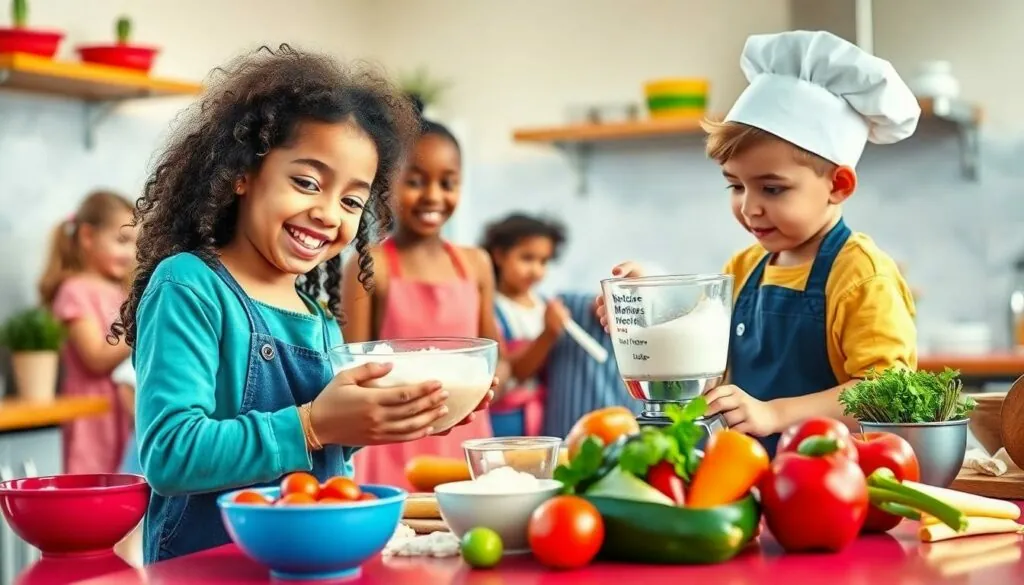Imagine a world where your little chef whips up gourmet meals instead of just cereal and toast. Kids cooking schools are popping up everywhere, and they’re not just about stirring pots and cracking eggs. They’re the perfect blend of fun, education, and a sprinkle of culinary magic.
These classes offer kids a chance to unleash their inner Gordon Ramsay without the yelling. From mastering the art of pizza-making to baking the fluffiest cupcakes, young cooks learn essential skills while having a blast. Plus, who wouldn’t want to brag about their child’s ability to sauté veggies like a pro?
Table of Contents
ToggleBenefits of Kids Cooking Schools
Kids cooking schools offer numerous advantages. These programs encourage hands-on learning and creativity in the kitchen.
Skill Development
Cooking classes teach children various culinary skills. Students learn techniques like chopping, measuring, and mixing ingredients. They acquire knowledge about nutrition and food safety, making meals healthier. Mastering basic recipes such as pasta or simple desserts boosts their culinary repertoire. Kids often explore different cuisines, sparking interest in diverse cultures. Skills developed in these schools extend beyond the kitchen, including math and problem-solving abilities through recipe measurements and cooking processes.
Confidence Building
Cooking schools foster self-assurance in children. Each successful dish crafted elevates their belief in their abilities. As they experiment with flavors and presentations, kids gain a sense of accomplishment. Learning to cook also encourages teamwork and communication when working with peers. Overcoming challenges, like a recipe that doesn’t work out as planned, teaches resilience. Each class provides a supportive environment, allowing kids to express their creativity while building lasting friendships.
Popular Kids Cooking Schools Near Me

Various kids cooking schools offer exciting opportunities for culinary exploration. These programs focus on teaching children essential cooking skills in a fun environment.
Local Recommendations
Local cooking schools often provide hands-on classes tailored for children. These schools usually offer courses on topics like pizza making, cupcake decorating, and even international cuisine. For example, Culinary Kids Academy hosts exciting workshops each week, while Little Chef School features family-friendly cooking classes. Parents can check community centers for additional classes, as many organizations partner to provide culinary education. Local recommendations frequently highlight the importance of creating a nurturing environment that fosters creativity and teamwork.
Online Resources
Various online platforms provide kids cooking classes that can be accessed from home. Websites like KidsCookRealFood.com offer comprehensive courses focusing on nutrition, cooking skills, and meal prepping. Cooking with Kids offers free resources, including recipes and video tutorials, designed for young chefs. Parents seeking flexibility appreciate virtual classes that fit busy schedules. Online resources often emphasize safety and provide age-appropriate instruction, making cooking enjoyable and educational for children. By tapping into these options, families can find classes meeting their children’s unique interests and preferences.
What to Expect at Kids Cooking Schools
Kids cooking schools provide structured, engaging environments for young chefs. Participants can anticipate a variety of activities designed to foster culinary skills while having fun.
Class Structure
Classes typically include hands-on cooking sessions paired with demonstrations. Children practice techniques like chopping, kneading, and measuring under the guidance of experienced instructors. Each session focuses on a specific recipe, ensuring that kids master the steps involved and learn about ingredient combinations. Teams often form, promoting collaboration and camaraderie while preparing meals together. Feedback is encouraged, allowing children to share their experiences and improve their skills. These interactive elements keep the learning dynamic and enjoyable.
Age Group Considerations
Age appropriateness plays a significant role in kids cooking schools. Classes often categorize participants based on their age and skill level, ensuring a tailored experience. Younger children might engage in simpler tasks like assembling sandwiches, while older kids tackle more complex recipes. Advanced classes dive into cultural cuisines, making exploration exciting. Schools strive to create a safe and encouraging atmosphere, allowing every child to participate comfortably. This careful consideration of age ensures that each child feels included and challenged in their culinary journey.
How to Choose the Right Kids Cooking School
Selecting the ideal kids cooking school requires careful consideration of several factors. Parents should prioritize location and program diversity to ensure a positive experience.
Location and Accessibility
Proximity plays a significant role in convenience. Examine schools within a reasonable distance from home. Accessibility matters, particularly if classes occur during busy schedules. Check for public transport options and parking availability, making travel easier for families. Schools situated in safe neighborhoods enhance peace of mind. It’s vital to assess whether the facility is child-friendly, with appropriate spaces for cooking and learning.
Program Variety
A broad range of programs caters to different interests and skill levels. Look for schools offering various cuisines, baking classes, and specialty workshops. Diverse programs keep kids engaged and motivated. Instructors should provide age-appropriate content to match children’s capabilities. Creative offerings, such as themed cooking parties and holiday events, enrich the experience. Familiarize yourself with the curriculum to ensure it combines fun, education, and skill development.
Finding a kids cooking school nearby can open up a world of culinary exploration for young chefs. These classes not only teach essential cooking skills but also promote creativity and teamwork. As children engage in hands-on learning, they develop confidence while discovering the joy of cooking.
Parents can take pride in watching their children master new recipes and connect with diverse cultures through food. With a variety of options available, from local schools to online resources, families can easily find the perfect fit for their child’s interests and schedule. Embracing this cooking journey can lead to lasting memories and valuable life skills that extend far beyond the kitchen.




